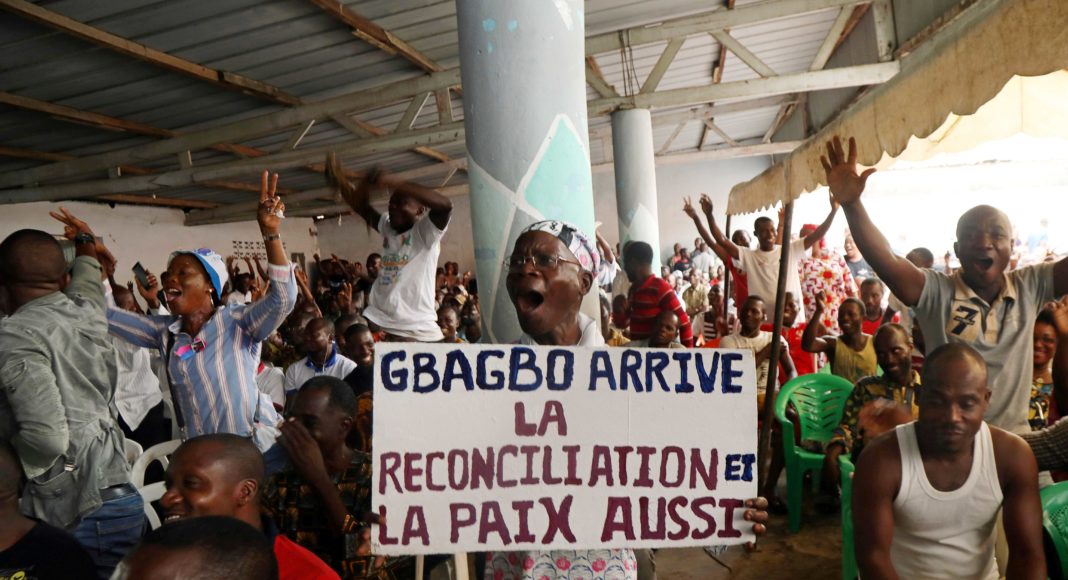By Ahmed Coulibaly
ABIDJAN —The International Criminal Court appeals chamber upheld the 2019 acquittals of former Ivorian President Laurent Gbagbo and his Minister of Youth Charles Blé Goudé on Wednesday, marking the official end of their trials in The Hague. While Gbagbo’s supporters in Abidjan celebrated, politicians from across the spectrum voiced a tepid optimism that their potential return could be a golden opportunity to usher in a more permanent peace for Côte d’Ivoire.
Detained since December 2011 at the ICC, Laurent Gbagbo and Charles Blé Goudé were accused of crimes against humanity committed during the post-election violence of 2010. At the end of the trial, ICC prosecutor Fatou Bensouda called for their acquittals to be overturned, but the evidence against them was not strong enough.
A high-ranking member of the ruling RHDP party who asked not to be named was hopeful that “the release of these two political figures could facilitate the reconciliation process already begun by the Ivorian government,” he said, arguing that Gbagbo is a spent political force. “Everything will depend on the content of their remarks, that they are not belligerent. The RHDP remains in the majority and we demonstrated this during the legislative elections by winning the majority in parliament. The opposition is divided and Laurent Gbagbo cannot unite them. If he could, even from a distance, he would do it,” he said.
For observers of Ivorian political life, reconciliation is the major project to which the two men of can actively contribute. Journalist and political scientist Mamadou Ouattara said that “this release will undoubtedly contribute to the relaxation of the socio-political situation. It is true that on the one hand there are the families of the victims who are calling for justice. It is up to the political actors, the government and the opposition, to come together on this.”
Ouattara noted that the government must take the initiative for peace to work. “We must put aside our personal interests and free the Ivorian people from their old demons. I particularly count on the good wisdom of our authorities to facilitate this.”
Former President Henri Konan Bedié, who heads the PDCI opposition party, agreed. He tweeted that “the acquittal of these two personalities and their definitive return to Côte d’Ivoire will certainly contribute to the easing the tense national political climate.”
An opinion supported by Soumahoro Maïmouna, a student at Houphouët Boigny University: “In their last speeches, Laurent Gbagbo and Blé Goué spoke of reconciliation. I think that when they arrive, not only will it help to establish responsibilities, but it will also give another atmosphere to Ivorian political life.”
Jean Bonin, vice president of the FPI and the party’s spokesperson asserted that Gbagbo doesn’t have much political sway over anyone anymore. “I sincerely do not think that the arrival of Laurent Gbagbo and Charles Blé Goudé will change anything politically. Because since the outbreak of the internal crisis in the FPI, he has never sought to get involved to solve the problem, quite the contrary in fact,” Bonin told Sahelien.com, referring to the FPI that split between supporters of Gbagbo and those of Pascal Affi N’guessan.
According to Ali Doumbia, a youth leader and politician from the Union for Democracy and Peace (UDPCI), this acquittals come as no surprise. “His release simply shows that the court prosecutor was unable to prove the guilt of Mr. Charles Ble Goude and Mr. Laurent Gbagbo. But this does not prove that they are entirely innocent. The great victims are the people, because one day we will have to know who was behind the killings,” Doumbia said.
Some observers are wary of too much optimism and think Gbagbo’s return could lead to more political instability in the country. Two prime ministers and chief confidants of President Alassane Ouattara have died in the last year, and the pandemic has devastated Ouattara’s famed economic growth. Ivorian courts could Pushto reopen domestic criminal cases against Gbagbo and Blé Goudé.
Journalist Eric Djaty said that the acquittals will revive political calculations. “At a time when Ouattara’s power is more fragile than ever with the recent death of his Prime Minister Hamed Bakayoko, the dice are being redistributed and the rules of the game may change in the coming months. It will be a real marathon between the opposition and the government in place for the conquest and re-conquest of the political terrain between the FPI – PDCI (EDS) and the RHDP. Will the Ivorian justice system bring out his conviction file or leave it in the closet for peace? The question still remains.”
Ultimately, it’s up to Gbagbo and Blé Goudé as to which path they want to take upon return to the country. If they come home showing real intent on reconciliation, their popularity might increase and their political power could begin to grow again.
But if their actions show otherwise, it’s likely that President Ouattara’s administration will do all it can to keep them in their isolated political position. Gbagbo has a large hill to climb should he attempt to reenter the political scene. He is no longer in charge of the fractured FPI party, which itself has fewer than 30 seats in parliament, compared to the RHDP’s 130.

